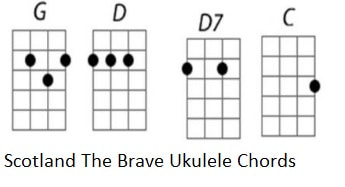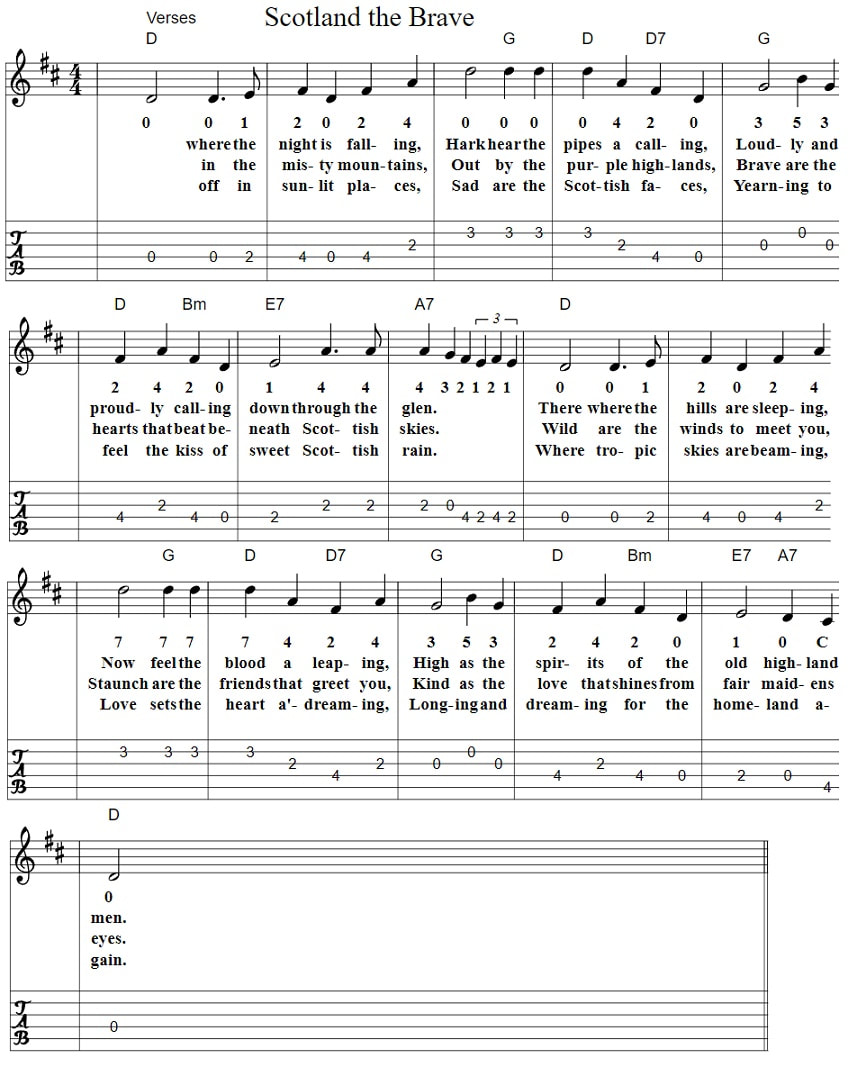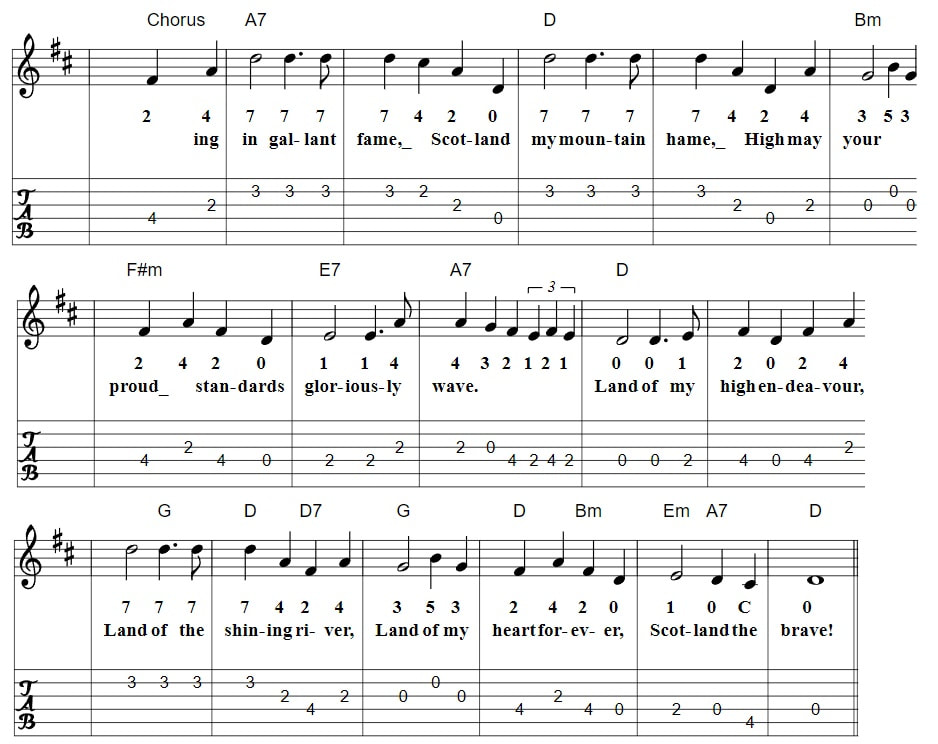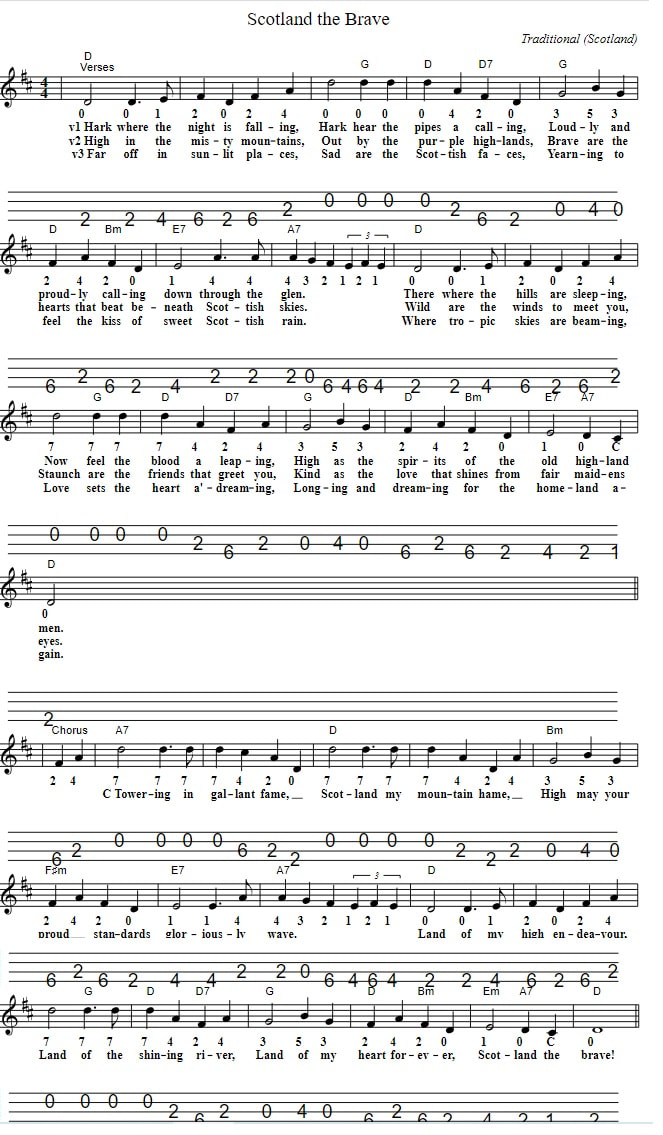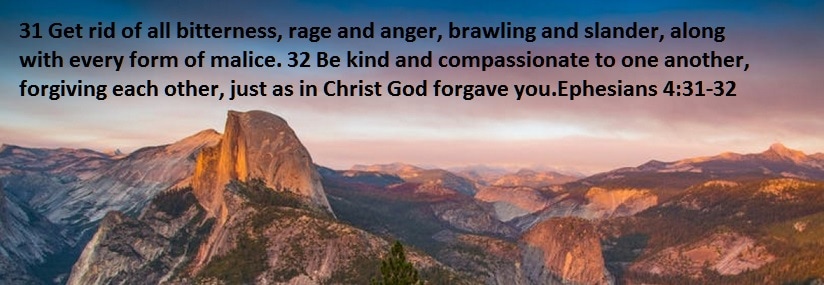Scotland The Brave Lyrics Guitar Chords
Written by Cliff Hanley 1950, the Ukulele chords are included. The youtube video is by Charlie Zahm. The Corries [ songs ] do a humerus version using different lyrics entirely, there are plenty of pipe band instrumental versions also. This song was voted the second most popular Scottish song of all time, beaten to the top spot by Flower Of Scotland [ song lyrics ]. Also recorded by John McDermot, André Rieu and The Dropkick Murphy's. Scotland the brave tenor guitar / mandola tab in CGDA tuning included.
|
[G)Hark when the night is falling,
Hear! hear the pipes are calling, (C)Loudly and (G)proudly calling, (D)Down thro' the glen.(D7) (G)There where the hills are sleeping, Now feel the blood a-leaping, (C)High as the (G)spirits of the (D)old Highland (G)men. Chorus (D)Towering in gallant fame, (G)Scotland my mountain hame, (C)High may your (G)proud standards (D)gloriously wave,(D7) (G)Land of my high endeavour, Land of the shining river, (C)Land of my (G)heart for ever, (D)Scotland the (G)brave. (G)High in the misty Highlands Out by the purple islands, (C)Brave are the (G)hearts that beat Be(D)neath Scottish skies.(D7) (G)Wild are the winds to meet you, Staunch are the friends that greet you, (C)Kind as the (G)love that shines from (D)fair maidens' (G)eyes. Another version of Scotland The Brave with different chords
[D]Hark when the night is falling Hear! hear the pipes are calling [G]Loudly and [D]proudly calling [E7]Down through the [A7]glen [D]There where the hills are sleeping Now feel the blood a-leaping [G]High as the [D]spirits Of the [A7]old Highland [D]men Chorus: [A7]Towering in gallant fame [G]Scotland my [D]mountain hame [Bm]High may your [F#m]proud standards [E7]Gloriously [A7]wave [D]Land of my high endeavour Land of the shining river [G]Land of my [D]heart for ever [A7]Scotland the [D]brave High in the misty Highlands Out by the purple islands Brave are the hearts that beat Beneath Scottish skies Wild are the winds to meet you Staunch are the friends that greet you Kind as the love that shines From fair maidens' eyes Far off in sunlit places Sad are the Scottish faces Yearning to feel the kiss Of sweet Scottish rain Where tropic skies are beaming Love sets the heart a-dreaming Longing and dreaming For the homeland again Hot as a burning ember Flaming in bleak December Burning within the hearts Of clansmen afar Calling to home and fire Calling the sweet desire Shining a light that beckons From every star. Scotland The Brave Sheet Music And Tin Whistle Notes Chords for the key of C Major.
Key of C [G]Hark when the night is falling, Hear! hear the pipes are calling, (F)Loudly and (C)proudly calling, (G)Down thro' the glen.(G7) (C)There where the hills are sleeping, Now feel the blood a-leaping, (F)High as the (C)spirits of the (G)old Highland (C)men. Chorus (G)Towering in gallant fame, (C)Scotland my mountain hame, (F)High may your (C)proud standards (G)gloriously wave,(G7) (C)Land of my high endeavour, Land of the shining river, (F)Land of my (C)heart for ever, (G)Scotland the (C)brave. (C)High in the misty Highlands Out by the purple islands, (F)Brave are the (C)hearts that beat Be(G)neath Scottish skies.(G7) (C)Wild are the winds to meet you, Staunch are the friends that greet you, (F)Kind as the (C)love that shines from (G)fair maidens' (C)eyes. |
|
Scotland is a country known for its rich cultural heritage, breathtaking landscapes, and fierce sense of national pride. One of the most iconic symbols of Scottish pride is the song “Scotland The Brave”. This rousing anthem has been sung by generations of Scots, evoking a sense of patriotism and nostalgia for the country’s history and traditions. In this thesis, we will explore the origins and significance of “Scotland The Brave”, its lyrical and musical composition, and its enduring impact on Scottish culture.
Origins of “Scotland The Brave”
The origins of “Scotland The Brave” can be traced back to the late 19th century, during a time of great social and political change in Scotland. The song was first composed by Cliff Hanley in 1951 for the Scottish National Party’s annual conference. Hanley, a Scottish journalist and playwright, was inspired by the country’s long history of struggle and resilience against English domination. He wanted to create an anthem that would unite the Scottish people and celebrate their national identity.
Lyrical and Musical Composition
The lyrics of “Scotland The Brave” are a powerful tribute to Scotland’s history, culture, and natural beauty. The song begins with the iconic line “Hark when the night is falling, hear, hear the pipes are calling”. This opening line immediately sets the tone for the rest of the song, invoking a sense of grandeur and pride. The repeated refrain of “Scotland, Scotland, Scotland The Brave” serves as a rallying cry for the Scottish people to stand together and face any challenge with courage and determination.
The music of “Scotland The Brave” is equally stirring and evocative. The melody, composed by Scottish musician and composer, William Henry Miller, is a traditional Scottish folk tune that has been used in various songs and dances throughout the country’s history. Miller’s composition perfectly captures the spirit of the Scottish people, with its uplifting and energetic melody. The combination of Hanley’s lyrics and Miller’s music creates a powerful and unforgettable anthem.
Impact on Scottish Culture
“Scotland The Brave” has become an integral part of Scottish culture, with its enduring popularity and widespread use in various events and occasions. It is often played at national sporting events, including football and rugby matches, to rally the crowd and show support for the Scottish team. The song is also a staple at traditional Scottish events, such as the Highland Games, where it is played during the opening ceremony to set the tone for the festivities.
Moreover, “Scotland The Brave” has been covered by numerous artists and has been featured in various films and television shows, further cementing its place in popular culture. Its use in these mediums not only showcases the song’s widespread appeal but also serves as a reminder of Scotland’s rich heritage and cultural traditions.
Conclusion
In conclusion, “Scotland The Brave” is more than just a song, it is a symbol of Scottish identity and pride. Its origins, lyrical and musical composition, and enduring impact on Scottish culture make it a beloved and important part of the country’s heritage. Whether sung by a lone piper on a misty Scottish hill or belted out by a crowd of passionate Scots, “Scotland The Brave” will continue to evoke a sense of national unity and pride for generations to come.
Origins of “Scotland The Brave”
The origins of “Scotland The Brave” can be traced back to the late 19th century, during a time of great social and political change in Scotland. The song was first composed by Cliff Hanley in 1951 for the Scottish National Party’s annual conference. Hanley, a Scottish journalist and playwright, was inspired by the country’s long history of struggle and resilience against English domination. He wanted to create an anthem that would unite the Scottish people and celebrate their national identity.
Lyrical and Musical Composition
The lyrics of “Scotland The Brave” are a powerful tribute to Scotland’s history, culture, and natural beauty. The song begins with the iconic line “Hark when the night is falling, hear, hear the pipes are calling”. This opening line immediately sets the tone for the rest of the song, invoking a sense of grandeur and pride. The repeated refrain of “Scotland, Scotland, Scotland The Brave” serves as a rallying cry for the Scottish people to stand together and face any challenge with courage and determination.
The music of “Scotland The Brave” is equally stirring and evocative. The melody, composed by Scottish musician and composer, William Henry Miller, is a traditional Scottish folk tune that has been used in various songs and dances throughout the country’s history. Miller’s composition perfectly captures the spirit of the Scottish people, with its uplifting and energetic melody. The combination of Hanley’s lyrics and Miller’s music creates a powerful and unforgettable anthem.
Impact on Scottish Culture
“Scotland The Brave” has become an integral part of Scottish culture, with its enduring popularity and widespread use in various events and occasions. It is often played at national sporting events, including football and rugby matches, to rally the crowd and show support for the Scottish team. The song is also a staple at traditional Scottish events, such as the Highland Games, where it is played during the opening ceremony to set the tone for the festivities.
Moreover, “Scotland The Brave” has been covered by numerous artists and has been featured in various films and television shows, further cementing its place in popular culture. Its use in these mediums not only showcases the song’s widespread appeal but also serves as a reminder of Scotland’s rich heritage and cultural traditions.
Conclusion
In conclusion, “Scotland The Brave” is more than just a song, it is a symbol of Scottish identity and pride. Its origins, lyrical and musical composition, and enduring impact on Scottish culture make it a beloved and important part of the country’s heritage. Whether sung by a lone piper on a misty Scottish hill or belted out by a crowd of passionate Scots, “Scotland The Brave” will continue to evoke a sense of national unity and pride for generations to come.
Scotland the brave guitar tab and chords
Scotland the brave tenor guitar / mandola tab in CGDA tuning
